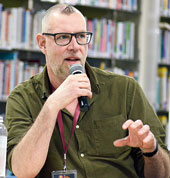
Camac Street: Crime writers from Scotland dropped in for adda sessions at British Council last week.
Metro was there to enjoy the talk about sleuths and inspirations
Scottish vs Bengali
Bengali and Scottish dry humour joined hands as jokes on choice of whiskey, brush with crime in personal life and community habits were exchanged.
Scottish writers Val McDermid and Graeme Macrae Burnet were joined by Abir Mukherjee, also Scottish but with roots in the city, as the conversation rolled on about Scottish and Bengali detectives and their crime-solving techniques.
Giving the local perspective were academician Abhijit Gupta, Bengali science fiction writer Abhijnan Roychowdhury and Debanjan Chakrabarti, the director (east and north-east) of British Council India.
"Most of us in Calcutta have read crime fiction in two languages - Bengali and English," said Gupta before introducing Byomkesh Bakshi and Prodosh Mitter to the guests from Scotland.
For McDermid, of The Mermaids Singing fame, it was Agatha Christie's The Murder at the Vicarage that gave her the first taste of crime fiction. "Her storytelling fascinated me," said the bestselling author, sharing how she would steal her mother's library card as a child and read her way through crime novels from adult libraries.

McDermid spoke about her first book, Report for Murder, and how that started her off in a 30-year career on crime fiction. "You need to have a devious mind to be a crime writer," she confessed.
Macrae Burnet, shortlisted for the 2016 Man Booker Prize for his novel His Bloody Project, had never wanted to be a writer. Nor was he hooked to books. It was J.D. Salinger's The Catcher in the Rye that made him turn towards literature. His idol: Belgian detective fiction writer Georges Simenon. Inspired by him, Macrae Burnet set two of his books in France. "The psychology of a criminal is what I find most interesting in a book."
Mukherjee took to writing crime in search of his identity. "My books are typically set in Calcutta of the 1920s. My protagonist is a British detective and through him I explore the city and my roots," the William Mcllvanney fan said.
The author of A Rising Man shared how he would read the Byomkesh Bakshi series to research the period. "And yet I found little reference of the Raj there. I wanted to see how the Indians and British interacted but the local flavour of the books were palpable," he said.
Murder they spoke
A freewheeling conversation between professor Supriya Chaudhuri and Scottish crime writer Val McDermid, arranged by BEE Books, Bloody Scotland and British Council, touched on the evolution of crime fiction, favourite crime fiction writers, the difficulties of writing fiction as series and their student days together at Oxford University.
Chaudhuri commented on how crime writing depends on a sense of space, to which McDermid agreed, citing Raymond Chandler's Los Angeles, Sara Paretsky's Chicago and Colin Dexter's Oxford.
"In a way, a crime novel is a kind of magic realism... If I wrote about murder investigations the way they really happen, you would give up on page 2!" said McDermid, for whom the heart of a book lies in the characters.
As a child, she figured out there are two kinds of series: one of the Famous Five template in which there is an "eternal summer" and nothing ever changes, including the characters, and the other was the Chalet School series by Elinor M. Brent-Dyer, in which characters grow up, go away to college, marry and find careers. She found the latter more interesting, realistic and complex, and hence wrote her own series in that manner. Her books, she said, focus not so much on the moral landscape as on the difference between justice and law.











